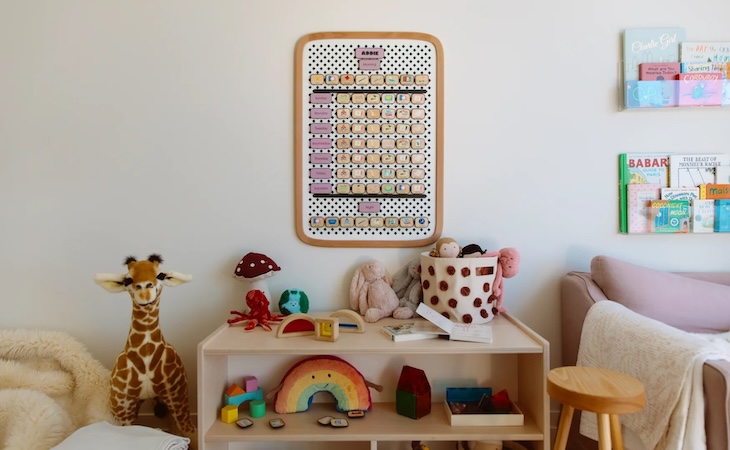You’ve hit your snooze button twice already. The kids are still fast asleep in their rooms. You glance at the clock and jolt out of bed to wake them up. Then comes a hurried tumble of showers, dressing, and packing for school. There’s barely enough time to feed them, much less yourself, so you grab a couple of granola bars on your way out the door.
Sound familiar? You don’t have to be a morning person to set up a structured wake-up routine with your children, but it does take some planning and organization. Just like bedtime routines, wake-up routines that are predictable and repeatable can help take the stress out of the morning.
“We all hate having a rough morning, and structure is so useful for ensuring that the day starts out positively,” says Lynelle Schneeberg, PsyD, pediatric sleep psychologist and author of Become Your Child’s Sleep Coach: The Bedtime Doctor’s 5-Step Guide, Ages 3-10. “With a structured routine, everyone knows what to expect, and parents and kids learn how much time it really takes to get everyone ready.”
Here are expert-backed tips to help you create a successful morning routine for you and your children.
Prepare as much as you can the night before
Following an organized nighttime routine plays a big role in how smoothly your morning will go. This is a good time to make a checklist of things your child will need the next day (such as a signed permission slip for a school trip or materials for special class projects), Schneeberg says.
“Have your children take baths at night, prep their outfits including shoes and outerwear, make lunches, and put books and homework in book bags,” Schneeberg says. “Everything that will be needed on the way out the door can be in a bin.” That will prevent you from frantically looking for things in the morning.
Sticking to a system means you won’t have to juggle as much if little things come up unexpectedly—plus, it will prevent you from getting into fights with your children. And no one wants to start the day by yelling.
“Children feed off of energy, so a frantic or stressed parent will lead to a stressed or anxious child,” says Ashanti Woods, MD, pediatrician at Mercy Medical Center in Baltimore. “Parents should set the tone of stability and calmness for the day.”
Related: A sleep coach’s 5-step plan for getting your kids to sleep
Prep a healthy breakfast and lunch for your kids
Woods says starting the day with a nutritious breakfast is key to a child’s success at school. To help you save some time in the morning, prep some grab-and-go dishes the night before. “Select a mix of fruits, veggies, whole grains, dairy, and protein, and avoid highly processed foods, like sugary cereal,” Woods says.
Some of Schneeberg’s favorite morning meals for children include breakfast sandwiches, smoothies, overnight oats, and toaster waffles. Make fun, colorful shapes with fruits, like apples, bananas, peaches, oranges, and grapes, and lay them over a bowl of oatmeal. The same rules apply to lunch. Prepare them in advance and set them in containers and sandwich bags so the kids can grab and go.
Stick to a regular bedtime ritual every day
“If the healthy habit of an established bedtime is started early in a child’s life, the hope is that the child will subconsciously continue this healthy habit for years to come,” Woods says.
To help you establish a consistent bedtime ritual with your children, follow Schneeberg’s 5Bs formula: bedtime bite, bath, brush teeth, and books. That means when it’s time to start winding down, they’ll know to shut off the TV and put away their toys. Reading aloud to your children and limiting their screen time before bed not only aids their cognitive development and learning skills but also deepens the bond between parent and child.
Schedule some “me time” in the morning
Parents should always plan to wake up before the kids, so it’s important to ensure you get enough sleep too. Depending on the routine that feels most comfortable for you, Schneeberg recommends parents get up about 15 minutes before their children. Some parents may opt to start even earlier, so they are showered and are dressed by the time their children are out of bed. Either way, baking in some alone time is essential to start the day right.
“Parents can turn on music they love, try a very brief meditation, light a candle, or turn on an essential oil diffuser,” suggests Schneeberg. “Make a cup of coffee or tea and have your clothes laid out.” She also likes to put up a sign on the fridge or by the kitchen counter with a motivating mantra to kick things off on a positive note. Here’s one of her favorites:
“There’s no way to be a perfect mother and a million ways to be a good one.” – Jill Churchill
Set a consistent rise time
Schneeberg recommends getting your kids out of bed 30 to 45 minutes before they have to head out in the morning. For example, if they have to be at school by 9 a.m., which is the standard for many elementary school-aged children, getting them up at 7:45 a.m. gives them plenty of time to shower, eat breakfast, brush their teeth, and be ready for a 30-minute bus ride to school.
Schneeberg says that creating a picture chart that maps out different tasks, like brushing teeth, combing hair, and getting dressed, can help you and your kids visualize each step. She also suggests playing some upbeat, energizing music as your kids are getting ready for school to boost everyone’s mood.
If your young ones are ready early and have a few minutes before the bus arrives, Woods says it’s OK for parents to reward their child with some playtime. “Kids can be rewarded with a toy to play with or watching an educational program on a tablet,” Woods says. However, video games are another story and should be avoided. “This can lead to a tug-of-war when it’s time to leave because they haven’t finished the game,” Woods says.
Schneeberg advises parents to use an “if, then” statement when it comes to playtime. You can say to your child, “If you finish everything—getting dressed and brushing your teeth—then you can play with these toys until it’s time to go.” Remind your kids with a two-minute warning when it’s time to shut everything off.
Be kind to yourself
The most important thing for parents to remember is to give yourself a break if things don’t go as planned. It’s normal for routines to go awry. Maybe your child wakes up with a fever or they suddenly remember they need a potato for that science project—or you might oversleep one morning and have to rush out the door.
The bottom line: “It’s OK for kids to eat a breakfast sandwich or a cup of overnight oats in the car,” says Schneeberg. “It’s OK for your kid to sleep in a T-shirt and some leggings so they wake up partially dressed. You don’t need to be perfect to be a good parent.”
Want more advice on how to get your kids into a regular sleep schedule? Follow these school-year sleep tips for children.





